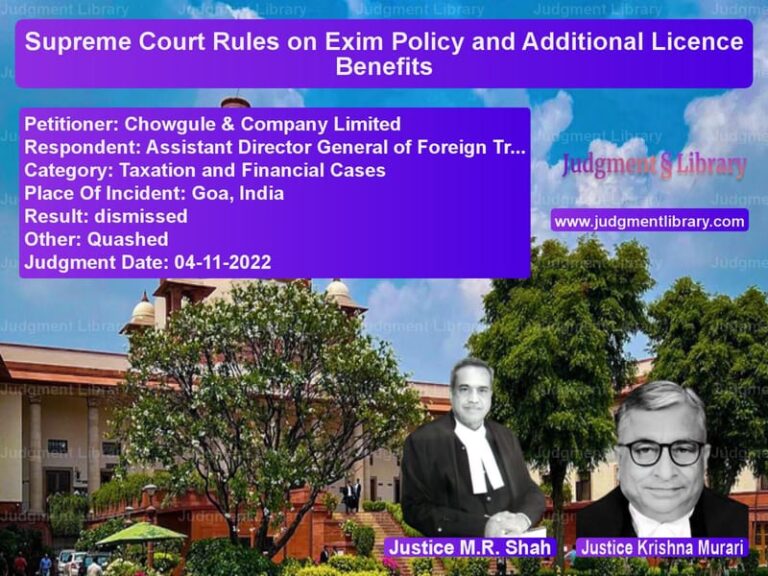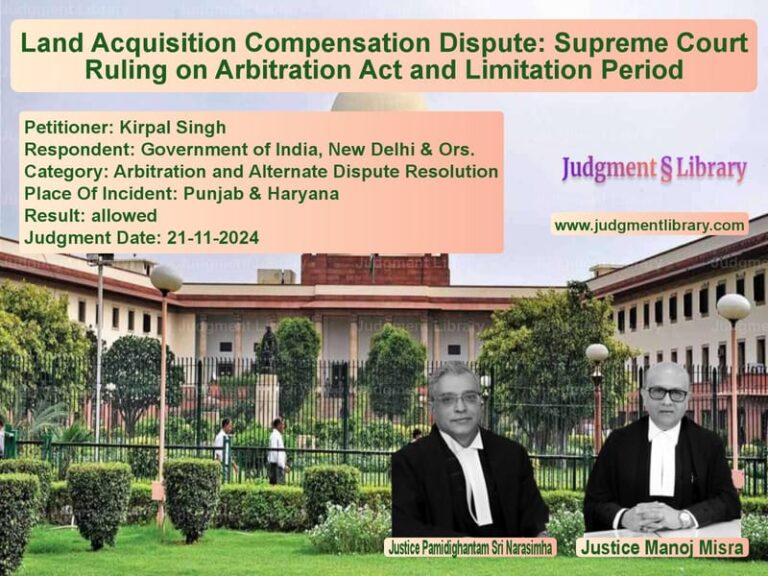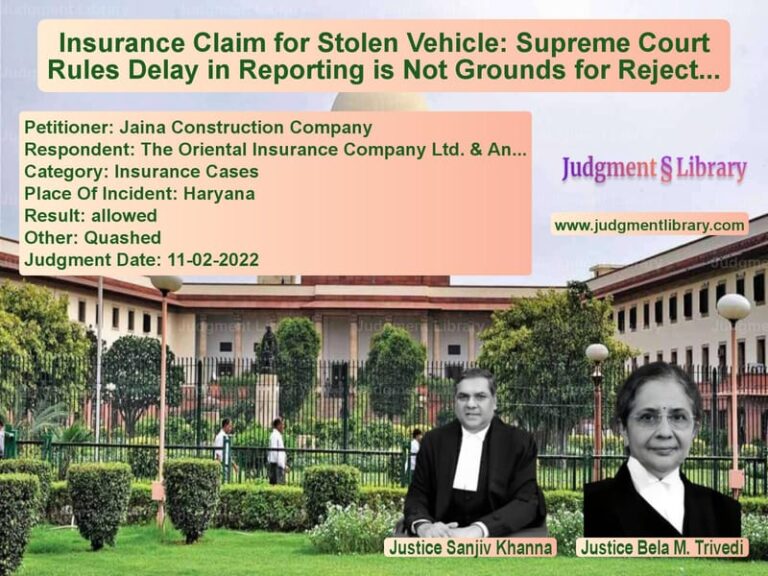Supreme Court Reduces GST Penalty on Expired E-Way Bill: Key Takeaways for Businesses
The Supreme Court of India recently ruled on the case of Vardan Associates Pvt. Ltd. vs. Assistant Commissioner of State Tax Central Section & Ors., involving the transportation of goods under an expired E-Way Bill. The court upheld the tax liability but reduced the penalty imposed, providing significant clarity on the treatment of procedural lapses under the GST regime.
Background of the Case
Vardan Associates Pvt. Ltd. (hereinafter referred to as the ‘appellant’) is a company engaged in horizontal directional drilling services for underground utilities such as oil, gas, telecom, and power. The company is registered under the Central Goods and Services Act, 2017 (CGST Act) and the West Bengal Goods and Services Act, 2017 (WBGST Act).
The appellant had been executing contracts for Gas Authority of India Limited (GAIL) and needed to transport its XCMG HDD Machine XZ6600—weighing approximately 68 tons—from Auraiya, Uttar Pradesh, to Durgapur, West Bengal. This machine was classified as ‘capital goods’ under Section 2(19) of the CGST Act.
For this transportation, the appellant generated an E-Way Bill on 30th May 2019, which was valid until 9th June 2019. However, due to logistical delays, the consignment was still in transit beyond the validity period. On 17th June 2019, the vehicle was intercepted by tax authorities while entering West Bengal.
Detention and Demand Order
The Assistant Commissioner of State Tax detained the consignment under:
- Section 129(1) of the CGST Act
- Section 129(1) of the WBGST Act
- Section 20 of the IGST Act
On 19th June 2019, the tax authorities issued a notice demanding:
- ₹54,00,000 in tax
- ₹54,00,000 as penalty
- Total liability: ₹1,08,00,000
The appellant filed its reply on 24th June 2019, arguing that the lapse was unintentional. However, on 27th June 2019, the tax authorities confirmed the demand, prompting the appellant to file an appeal before the Appellate Authority.
Legal Battle in High Court
The appellant initially paid 10% of the tax amount (₹5,40,000) to file an appeal on 19th July 2019. The High Court of Calcutta directed the Appellate Authority to resolve the matter quickly, but the authorities refused to release the consignment without full payment. The High Court ruled that the consignment could be released only upon:
- Full tax payment of ₹54,00,000
- 50% of the penalty amount in cash (₹27,00,000)
- The remaining 50% of the penalty (₹27,00,000) via a bank guarantee
Arguments Presented Before the Supreme Court
Appellant’s Arguments:
- The expired E-Way Bill was due to unforeseen logistical delays.
- The consignment was not for sale but for inter-unit transfer.
- The full tax amount was already accounted for, and levying a heavy penalty was excessive.
- The consignment was detained for an extended period, leading to financial hardship.
Respondents’ Arguments:
- The law mandates a valid E-Way Bill for movement of goods.
- Failure to renew the E-Way Bill amounts to a violation of GST rules.
- The appellant’s plea of unintentional lapse does not negate liability.
Supreme Court’s Verdict
The Supreme Court acknowledged the appellant’s compliance failure but took a balanced approach. The key rulings were:
- Tax liability of ₹54,00,000 was upheld since it was a legal requirement.
- The penalty was reduced from ₹54,00,000 to ₹27,00,000 (50% reduction).
- Total payable amount: ₹81,00,000 (₹54,00,000 tax + ₹27,00,000 penalty).
- The amount was to be deposited by 29th February 2024.
- The detained consignment and vehicle would be released after payment.
- The appellant was cautioned to ensure future compliance.
Legal and Business Implications of the Judgment
This ruling provides several important takeaways for businesses and tax professionals:
1. Importance of E-Way Bill Compliance
Even an expired E-Way Bill can lead to hefty penalties and detention of goods. Businesses must:
- Monitor the validity of E-Way Bills.
- Renew them promptly in case of transportation delays.
- Ensure logistics providers comply with GST rules.
2. Balanced Approach to Penalties
The Supreme Court acknowledged that procedural lapses should not attract disproportionately high penalties. However, businesses cannot ignore regulatory obligations.
3. Inter-Unit Transfers Under GST
Even when goods are moved between different units of the same entity, they require a valid E-Way Bill. Companies engaged in such transfers must ensure compliance to avoid tax liabilities.
4. Judicial Precedent for Future Cases
This ruling sets a precedent where courts may reduce penalties for procedural lapses while upholding tax liabilities. However, businesses cannot rely on judicial leniency and must prioritize compliance.
Read also: https://judgmentlibrary.com/taxation-treaty-interpretation-and-the-mfn-clause-a-landmark-judgment/
Conclusion
The Supreme Court’s decision in Vardan Associates Pvt. Ltd. vs. Assistant Commissioner of State Tax serves as a crucial reminder for businesses engaged in the transportation of goods. While procedural errors can happen, companies must be proactive in ensuring compliance to avoid unnecessary financial burdens. This case underscores the significance of maintaining valid E-Way Bills and highlights the judiciary’s role in ensuring fair enforcement of tax laws.
Petitioner Name: Vardan Associates Pvt. Ltd..Respondent Name: Assistant Commissioner of State Tax Central Section & Ors..Judgment By: Justice Hima Kohli, Justice Ahsanuddin Amanullah.Place Of Incident: West Bengal.Judgment Date: 31-10-2023.
Don’t miss out on the full details! Download the complete judgment in PDF format below and gain valuable insights instantly!
Download Judgment: vardan-associates-pv-vs-assistant-commission-supreme-court-of-india-judgment-dated-31-10-2023.pdf
Directly Download Judgment: Directly download this Judgment
See all petitions in GST Law
See all petitions in Tax Refund Disputes
See all petitions in Banking Regulations
See all petitions in Judgment by Hima Kohli
See all petitions in Judgment by Ahsanuddin Amanullah
See all petitions in partially allowed
See all petitions in Modified
See all petitions in supreme court of India judgments October 2023
See all petitions in 2023 judgments
See all posts in Taxation and Financial Cases Category
See all allowed petitions in Taxation and Financial Cases Category
See all Dismissed petitions in Taxation and Financial Cases Category
See all partially allowed petitions in Taxation and Financial Cases Category







